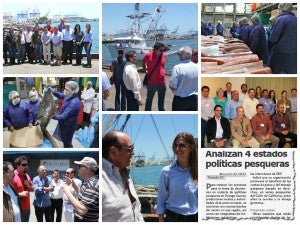Last week I had the pleasure of accompanying senior fisheries officials from four Mexican states to Southern California, where they met with fishermen, seafood processors and members of the Pacific Fishery Management Council (PFMC). As they establish and reinforce their own fishery management systems and structures, this trip was a chance for Mexican officials to see firsthand a well-established system that has evolved for decades – and generally succeeds – through broad-based stakeholder participation and a commitment to transparency.
In 2007 the four states with Gulf of California coastlines – Sonora, Sinaloa, Baja California and Baja California Sur – were mandated by the new Mexican Fisheries Law to establish fishery management structures. Some are further along than others, but each face daunting challenges; Limited manpower and finances, little governing infrastructure and minimal baseline scientific data that are so critical to fishery management.
Although I don’t presume to speak for the individual fishery leaders, I think it’s safe to say that this trip was a success. Based on our conversations, here are some of the concepts that made the strongest impressions on them during the visit:
- There are real benefits in having state fishery officials working with other states through a regional body, and sharing equally not only in the responsibilities of fishery management, but in the “best available science” that informs “best possible decision-making.”
- There is real power in the council process. The decisions they reach have deep and serious implications, and it is clear from our conversations that this level of influence in the public policy process weighs heavily on council members as they deliberate and dialogue.
- There is great respect for the views of fishermen (in the PFMC process), but there are also time-proven filters – the Council advisory committees that EDF staffers participate in. These advisory bodies air out and “stress-test” the concerns, opinions and recommendations of industry leaders and NGOs before they are presented to the Council. In a process that often involves week-long Council meetings, this filtering and testing is essential to the Council’s effectiveness.
- The federal government plays a critical role in Council processes, but they participate as mutually respectful equals with the states, and a very healthy give-and-take is evident during Council meetings.
Not every policy and tactic in the Pacific are applicable to Mexico, but the fishery officials certainly benefited from a wealth of “lessons-learned” by West Coast fishery managers, and as we all know, lessons learned by someone else are often the best kind!
The Gulf of California states comprise a geographically and economically distinct region with fantastic marine resources. Developing management systems to support those resources and coastal economies will take a long time, but my staff and I look forward to helping in every way we can.
Delegation members Carlos Aceves and Daniel Vargas (Baja California State); Jose Fernando Garcia and Armando Herrero (Baja California Sur); Cuauhtemoc Castro and Cesar Julio Saucedo (Sinaloa State) ; Javier Vivian and Raúl Molina (Sonora State); and Anayeli Cabrera and Eduardo Rolon (Community & Biodiversity, Mexico City).










